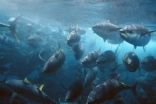(Press-News.org) Looks matter – even when it comes to money.
A new study co-authored by a University of Guelph professor has found that currency's physical appearance dramatically affects consumer behaviour.
People are more likely to spend dirty, crumpled currency and hold on to new bills, according to the study forthcoming in the Journal of Consumer Research and available online now.
But in social situations – and especially when they're looking to impress someone else -- people reach for new bills even when they have older, higher-denomination currency on hand.
"Basically, the physical appearance of money matters more than traditionally thought," said Theodore Noseworthy, a professor in Guelph's Department of Marketing and Consumer Studies who conducted the research with Fabrizio Di Muro of the University of Winnipeg.
It's an important finding for many reasons, Noseworthy said, primarily because it challenges some long-held beliefs that we perceive only the nominal (face) value of money.
"We tend to regard currency as a means to consumption and not a product itself. In other words, it should not matter if it's dirty or worn because it has the same value regardless," he said.
"But what we show is that money is indeed a vehicle for social utility, and that it's actually subject to the same inferences and biases as the products it can buy."
In five different studies, the researchers gave subjects new or old bills and asked them to shop and spend. In all of the studies, people spent more and took more chances with old, worn money.
All of the studies found the same main reason: people's aversion to "dirty money."
"It's the 'ick' factor," Noseworthy said. "The idea of touching something that others also handled: people want to rid themselves of worn currency, because they are disgusted by the contamination from others."
He said people value a crisp new bill because they take pride in it, especially when they can spend it around others. People were more likely to spend more of their new-looking currency, even if they had to use four $5 bills rather than one crumpled $20 bill.
"It turns out money itself can be part of conspicuous consumption," Noseworthy said.
This research has caught the eye of authorities who print new currency and take "old" money out of circulation, particularly in an economy driven by consumer spending, said Noseworthy.
The study might also interest Canadian authorities, who recently introduced more durable polymer bills that will likely look "new" longer.
### END
'Dirty money' affects spending habits, new study finds
2012-11-14
ELSE PRESS RELEASES FROM THIS DATE:
GEOLOGY speeding top science to online platform
2012-11-14
Boulder, Colo., USA – Between 19 October and 13 November, The Geological Society of America's top geoscience journal, GEOLOGY, posted 35 new studies online ahead of print. A selection of those studies is highlighted here and includes a broad spectrum of geoscience disciplines, such as volcanology, glaciology, paleoclimatology, paleontology, and mineralogy, with locations like the Society Islands, the U.S. Basin and Range Province, the Mojave Desert, Timor, Nicaragua, New Zealand's Southern Alps, and the Arctic Ocean Beaufort Sea margin.
To view all GEOLOGY articles published ...
Pacific fishing zones -- lifeline for overfished tuna?
2012-11-14
Marine zoning in the Pacific Ocean, in combination with other measures, could significantly improve numbers of heavily overfished bigeye tuna and improve local economies, a fish modelling study has found.
Scientists working at the University of Hawaii at Manoa (Honolulu, HI), the Secretariat of the Pacific Community (SPC, Noumea, New Caledonia) and Collecte Localisation Satellites (CLS, Toulouse, France), have found that a network of marine zones in the Pacific Ocean could be a more effective conservation measure than simply closing relatively small areas to some types ...
PNNL expertise highlighted at Supercomputing
2012-11-14
From identifying common patterns in data to speeding up computers, researchers from the Department of Energy's Pacific Northwest National Laboratory will share their computational expertise at this year's Supercomputing conference.
Also referred to as SC 12, the annual gathering is the international conference for high-performance computing, networking, storage and analysis. It runs Nov. 10-16 at the Salt Palace Convention Center in Salt Lake City. Two noteworthy talks featuring PNNL research are described below.
New algorithm pin-points similar data in seconds
Data ...
Computer science helping the aged stay home
2012-11-14
University of Adelaide computer scientists are leading a project to develop novel sensor systems to help older people keep living independently and safely in their own homes.
The researchers are adapting radio-frequency identification (RFID) and sensor technologies to automatically identify and monitor human activity; to be able to determine if an individual's normal routine is being maintained so that timely assistance can be provided if it is needed.
Although RFID technology has been around since World War 2 and is in common use today in applications such as anti-shoplifting ...
Preserve the services of mangroves -- Earth's invaluable coastal forests, experts urge
2012-11-14
Experts are urging policy makers to preserve mangroves and their essential services to nature and humanity alike, saying their replacement with shrimp farms and other forms of development is a bad economic tradeoff both short and long-term.
An unprecedented partnership of organizations – from forestry and conservation sectors and from across the United Nations – have released a policy brief drawing on the 2nd edition of the World Atlas of Mangroves (2010). It aims to provide managers with lessons learned in past mangrove conservation and management efforts, and with policy ...
The leggiest animal on Earth lives in the outskirts of Silicon Valley
2012-11-14
The leggiest animal in the world, the millipede lllacme plenipes, was re-discovered several years ago in California by Paul Marek. Now, Marek and his colleagues provide further details of the surprisingly complex anatomy of this diminutive creature and its extreme rarity, limited to a handful of spots just south of San Francisco. More details about the species and its biology can be read in an article that was recently published in the open access journal ZooKeys.
Millipedes have the most legs of any animal group. From their ancestors with just one pair of legs per body ...
Lost in space: Rogue planet spotted?
2012-11-14
Astronomers using ESO's Very Large Telescope and the Canada-France-Hawaii Telescope have identified a body that is very probably a planet wandering through space without a parent star. This is the most exciting free-floating planet candidate so far and the closest such object to the Solar System at a distance of about 100 light-years. Its comparative proximity, and the absence of a bright star very close to it, has allowed the team to study its atmosphere in great detail. This object also gives astronomers a preview of the exoplanets that future instruments aim to image ...
Astronomers find 'homeless' planet wandering through space
2012-11-14
A planet that is not orbiting a star, effectively making it homeless, has been discovered by a team of University of Montreal (UdeM) researchers working with European colleagues and data provided by the Canada-France-Hawaii Telescope (CFHT) and the European Southern Observatory's Very Large Telescope (VLT). "Although theorists had established the existence of this type of very cold and young planet, one had never been observed until today," said Étienne Artigau, an astrophysicist at UdeM. The absence of a shining star in the vicinity of this planet enabled the team to study ...
Georgia Tech releases cyber threats forecast for 2013
2012-11-14
The year ahead will feature new and increasingly sophisticated means to capture and exploit user data, escalating battles over the control of online information and continuous threats to the U.S. supply chain from global sources. Those were the findings made by the Georgia Tech Information Security Center (GTISC) and the Georgia Tech Research Institute (GTRI) in today's release of the Georgia Tech Emerging Cyber Threats Report for 2013. The report was released at the annual Georgia Tech Cyber Security Summit, a gathering of industry and academic leaders who have distinguished ...
Pancreas stem cell discovery may lead to new diabetes treatments
2012-11-14
Stem cells in the adult pancreas have been identified that can be turned into insulin producing cells, a finding that means people with type 1 diabetes might one day be able to regenerate their own insulin-producing cells.
The discovery was made by scientists from the Walter and Eliza Hall Institute and provides further evidence that stem cells don't only occur in the embryo.
The ability to produce the hormone insulin is crucial for controlling blood sugar (glucose) levels. In people with type 1 diabetes the body's immune system destroys the insulin-producing beta cells ...






